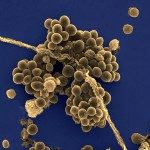Lien vers Pubmed [PMID] – 16718605
Biometals 2006 Apr;19(2):205-10
Most bacteria require iron for growth. However, as it may not be directly available under aerobic conditions, bacteria may use iron-sequestering molecules, such as bacterially encoded siderophores, or heme, which is the major iron source in the animal host. Bacteria may also assimilate heme for purposes other than as an iron source. Once internalised, heme can activate, for example, a heme-dependent catalase and a cytochrome oxidase. In bacterial pathogen Streptococcus agalactiae, heme, in association with exogenous menaquinone, activates a respiratory chain. Respiration has radical effects on carbon metabolism. GBS respiration-grown cells display improved survival in an aerobic environment and greater virulence in a murine septicemia model. GBS might benefit from its ecological niches to capture heme and menaquinone, i.e., from other bacteria when it colonizes host mucosa, or from blood-containing organs during septicemia.

